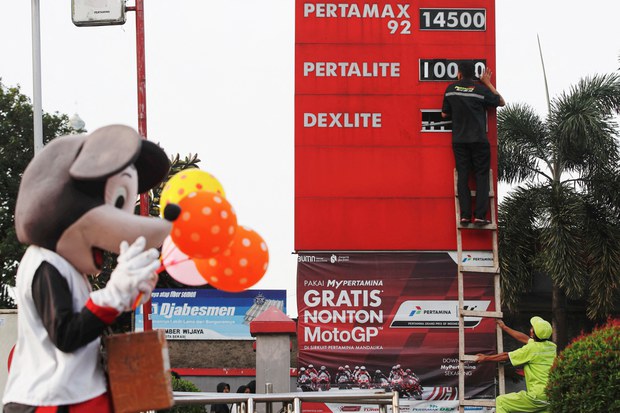IDNAround – Indonesia increased fuel prices by around 30 percent on Saturday, slashing spending on rising subsidies despite the risk of mass protests, even as experts said the hike could jeopardize any economic recovery from the COVID-19 pandemic.
The price of subsidized petrol was hiked to 10,000 rupiah (U.S. $0.67) a liter from 7,650 (U.S. $0.51) rupiah, while the cost of subsidized diesel was hiked to 6,800 rupiah a liter from 5,150 rupiah, said Indonesian President Joko “Jokowi” Widodo. The price increases went into effect Saturday at 2:30 p.m.
Jokowi said the subsidy budget had gone up more than three times to 502.4 trillion rupiah (U.S. $34 billion), as global fuel prices had skyrocketed.
“I actually wanted domestic fuel prices to remain affordable by providing subsidies, but the budget for subsidies has tripled and will continue to rise,” the president told a news conference in Jakarta.
“This [fuel price hike] is the government’s last option.”
These price increases are the first since 2014, when a 30 percent hike in fuel prices led to nationwide protests and strikes by students and transport operators. Citizens here see subsidized fuel as a public service obligation, says the Asian Development Bank, and fuel price increases are a very sensitive issue that have caused riots in the past.
Already, the Labor Party and some labor organizations have threatened to hold protests in several cities across the country on Sept. 6.
Said Iqbal, the chairman of the Labor Party, said the price increases would hit workers hard, especially factory workers, who have not received salary increments for the past three years.
He also said there mass layoffs may now occur as companies try to increase their bottom line following the fuel price increase.
“If the protest on Sept. 6 remains unheard by the government and the parliament, the Labor Party and the Confederation of Indonesian Trade Unions (KSPI) will organize a follow-up action,” he said.
Over the past few days, there have already been small protests in several cities after news emerged that fuel prices would be hiked, reported Reuters news agency.
For its part, the government has planned handouts to cushion the impact of the fuel price rise, said Minister of Finance Sri Mulyani Indrawati, at the same press conference as Jokowi.
She said the government is allocating a portion of the fuel subsidy, 12.4 trillion rupiah, as direct cash aid for 20.65 million families in need.
Additionally, she announced 9.6 trillion rupiah in wage subsidies for 16 million workers with monthly salaries below 3.5 million rupiah.
“We also ask the local governments to use 2 percent of the general transfer funds for public transportation, online bike taxis, and fishermen assistance,” said Jokowi.
Minister of Social Affairs Tri Rismaharini said the direct cash aid would be distributed in two parts, in September and in December. He said the government has also designated a registration period for people in need of financial assistance.
“People can file requests for assistance, and we will be checking with our assistants. We have 70,000 assistants,” said Rismaharini.
Least Creative Mechanism
A rise in fuel prices has a ripple effect on the economy, leading to an increase in the prices of all commodities, including food, and food inflation is already high, said economist Bhima Yudhistira.
Food price inflation was recorded at 8.55 percent year-on-year in August, and may cross 10 percent in September, said Bhima, executive director at the Center of Economic and Law Studies (CELIOS).
“The public is clearly not ready to face this increase in [fuel] prices,” Bhima told BenarNews.
“Raising the price is the least creative mechanism.”
Another economist, Fahmi Radhi, said the fuel price hike would lead to an economic slowdown.
“People’s buying power will drop and economic growth will decline again since consumption is the largest component in Indonesia’s economic growth,” Fahmi, from Gajah Mada University, told BenarNews.
Mamit Setiawan, executive director of Energy Watch, acknowledged that growth will slow, but said that a cut in fuel subsidies was inevitable.
“There will definitely be an economic slowdown. The economy, which had grown by [about] 5 percent [in the second quarter of 2022], could stagnate or slow down,” he told BenarNews.
“However, subsidies are counterproductive as they have widened the gap between rich and poor,” Mamit told BenarNews.
According to him, the fuel subsidy policy has widened the gap between the rich and the poor because the rich also enjoy the benefit of the subsidies, which adds pressure to the state budget.
Central lawmaker Sartono Hutomo, a member of parliament, concurred.
He said the government needed to fix the distribution of subsidized fuel instead of increasing the price.
“The real work is to control the distribution of subsidized fuel to those who really deserve it,” the Democratic Party politician said in a statement.
“The price hike is not the solution that the people want.”
Related: BI Launches Government Credit Card and QRIS International

